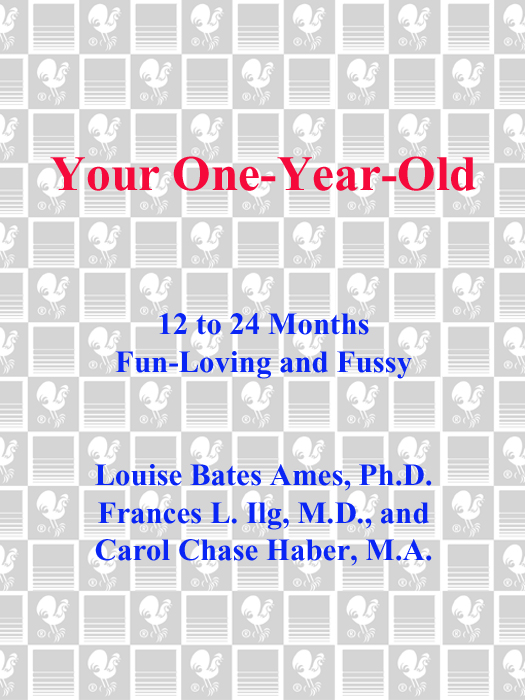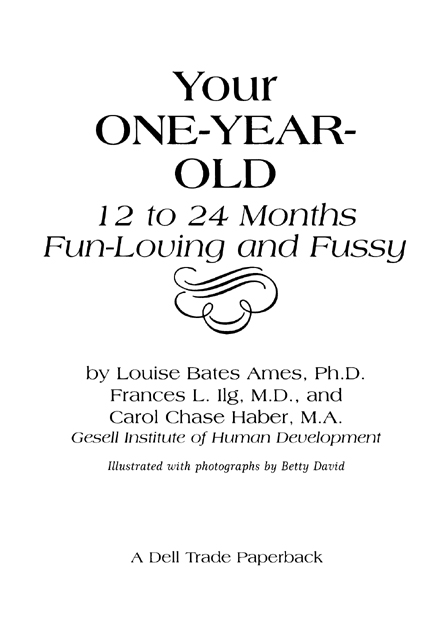A Dell Trade Paperback
Published by
Dell Publishing
a division of
Bantam Doubleday Dell Publishing Group, Inc.
1540 Broadway
New York, New York 10036
Excerpts from FEED YOUR KIDS RIGHT by Lendon Smith, M.D.
(Copyright 1979 by Lendon Smith, M.D.), are reprinted by
permission of McGraw-Hill Book Company.
Copyright 1982 by Louise Bates Ames, the Estate of Frances Ilg,
and Carol Chase Haber
Photographs copyright 1982 by Betty David
All rights reserved. No part of this book may be reproduced or transmitted in any form or by any means, electronic or mechanical, including photocopying, recording, or by any information storage and retrieval system, without the written permission of the Publisher, except where permitted by law.
For information address Delacorte Press, New York, New York.
The trademark Dell is registered in the U.S. Patent and Trademark Office.
eISBN: 978-0-307-80942-1
v3.1
CONTENTS
chapter one
YOUR INFANT
BECOMES A TODDLER
Your boy or girl is officially a One-year-old until the time of that second birthday, when he or she becomes officially a Two-year-old.
At the time of his important first birthday your infant is a treasure and a joy to all concerned. Your typical Twelve-month-old tends to be an extremely lovable little personfriendly, sociable, amenable. Given a reasonably favorable personality, normally good health, and a modestly supportive environment, most One-year-olds seem to adapt rather easily to whatever it is the adult caretaker has in mind. And it is usually easy for the adult to adapt to what the baby has in mind.
Your Two-year-old also should be fun. By the time he is Two he will have much to say. He will tend to like other people and to appreciate their attention. He will cuddle and kiss. He will, on request, proudly show you his eyes, his nose, his mouth, his arms, his foot. He is excited about what he knows and what he can do. He loves to have you play with him, and he usually does his best to please you.
He can feed himself, even though messily, and he tends to cooperate when you dress and change him. In short, most of the time he is a real pleasure to those around him.
All this being true, with One so delightful and Two so terrific, we might anticipate that in the months between your childs first and second birthday, with locomotion and a certain amount of language among his new abilities, life would become ever easier.
Is this the case? Do children move smoothly through these special months, merely getting bigger and more capable as they approach Two? Not at all.
Certainly, as a child moves from Twelve to Fifteen, Eighteen, and Twenty-one months of age his vocabulary grows, his ability to handle objects increases, and he becomes more mobile. Getting around is no longer restricted to creeping on all fours or cruising beside stable objects. Now your toddler can walk around the house, run, and get up and down the stairs with ease.
It is indeed true that many children during this second year of life seem to advance light-years in their basic abilities. But they do not necessarily become easier to live with. As human behavior develops, often the negative parts of a personality show themselves before the positive. You will find that most little boys and girls tend to say no before they say yes, throw things before they become interested in picking them up, run away from you before they are able to respond to Come here, dear.
In fact, much of any childs effort, in the second year of life, seems to be devoted to building up his or her own independent way of doing things, and that way is much of the time the exact opposite of what you, the parent, have in mind.
So passing the Twelve-month mark and graduating from infancy do not by any means imply that your child is about to settle down. On the contrary, he seems eager to exercise his new powers. He becomes demanding. He strains at the leash. While being dressed, he may now have to be held bodily. In his chair he stretches forward demandingly toward things he cant reach. He wants to hold and carry something in each hand, or he may himself want to be carried even after his increasing weight makes him something of an armful. And he is beginning to insist on doing things for himself.
We may think of life for the One-year-old as a building wave which crests around the age of Eighteen months. Even by Fifteen months this wave of increasing egocentricity, demandingness, and opposition is well on the rise. Just getting the child of this age through his or her daily routines is no picnic.
At Eighteen months of age, which we shall especially emphasize in this volume, this hypothetical wave will crest. Then, on its way toward the calm which usually comes at about Two, the child will go through the Twenty-one-month-old stage. Whether this age zone will be smooth or stormy depends largely on the individual child. If well advanced in behavior, he or she may be approaching the calm and smoothness of Two. If the child is less advanced, Twenty-one months can be as stormy and difficult as Eighteen months.
Overall, though, parents will find their One-year-olds increasing abilities in all departments a source of pleasure and pride, even though the negative side of his personality will be tough to deal with. Whatever your childs temperament, the twelve months which follow his first birthday will be full of surprises. It will be a time when you will need all the ingenuity, all the resilience you can muster. We hope the information we give you in this book may help make this often tumultuous year of living go more smoothly than it otherwise might.
chapter two
WHAT YOU SEE IN
EARLY INFANCY CAN
HELP YOU UNDERSTAND
LATER BEHAVIOR
It is probably fortunate that babies are infants before they are anything else since infants teach us many lessons which, if well learned right at the start, will stand any parent in good stead through the long years of childhood.
Of the two main lessons which your infant will teach you, the first is that nothing you do will substantially speed up his development. Various abilities will appear when they are programmed by nature to appear. Just as you cannot speed up your childs teething, you cannot, even by serious efforts, substantially speed up the time when various behaviors will make themselves evident.
The second major lesson is that every infant and every child is an individual, different in major respects from every other. Parents can help children fully express their positive characteristics and can usually discourage them from some of their less positive traits. But as a parent you cannot determine what your child will be like.
A third important lesson which any infant can teach you is that you do not have to teach him how to perform many of the basic tasks of living. Your child will eventually sit alone with only modest encouragement from you. He will crawl and later creep without your showing him how. Though you may in your enthusiasm encourage such baby games as pat-a-cake, the actual basic motion that underlies this game (patting the hands together in a horizontal movement of the arms) comes into the infant repertoire quite naturally and without demonstration from you.
The vitally important, and exciting, matter of individual differences will be discussed at some length in . Here we would like to emphasize the important fact that in most cases, even with rather vigorous and well-intentioned efforts, parents cannot substantially speed up any of the usual infant behaviors.






